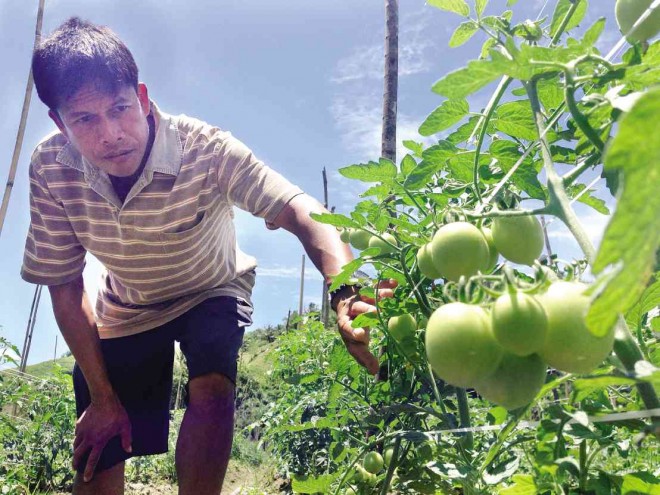Rising from ‘poorest of the poor’ in T’Boli

JOHNNY Tolentino at his farm in T’boli, South Cotabato province. Tolentino is one of a few success stories in a tableau of failed poverty reduction attempts. JEOFFREY MAITEM
Farmer Johnny Tolentino recalls how he was barely surviving hand-to-mouth when he first received five years ago the P4,000 cash assistance from the Department of Social Welfare and Development (DSWD) under its Pantawid Pamilyang Pilipino Program (4Ps).
“You can’t imagine,” the 43-year-old man said. “What we needed to eat for lunch, we still needed to earn at breakfast.”
Tolentino was planting only okra and other vegetables in a half-a-hectare lot that a municipal official in T’boli, South Cotabato province, had allowed him to till.
Now, he is one of the largest suppliers of bell peppers in the province, his produce reaching as far as Cagayan de Oro City and Manila. He earns more than P100,000 a month and has bought his own cargo truck.
Never in his wildest dreams did he think it possible for him to earn P2 million in 100 days, growing and selling tomatoes and bell peppers, Tolentino said. This happened only recently when bell peppers and tomatoes hit the highest price in the market.
On a smaller scale, such things have been happening to him in the last five years when, through sheer hard work, persistence and a little cash assistance from the government’s Self Employment Assistance para sa Kaunlaran (SEA-K) program, he worked hard to overcome poverty and started carving a better life for his family.
Poorest of poor
Tolentino was among the poorest of the poor in the DSWD’s list of 4Ps beneficiaries in 2009. The cash grant he received that year helped him send his children to school at the time when the family was barely surviving.
Two years later, the couple’s break came when they heard about the P10,000 loan for Pantawid Pamilya beneficiaries. His wife, Annalie, had thought of putting up a small business selling kakanin (native delicacies) on the road, but he convinced her to just continue their vegetable garden because it’s what he is doing well.
In 2011, using only about half-a-hectare parcel of land, Tolentino took the risk of planting bell peppers, even before the DSWD could release the cash assistance. His bell peppers were already bearing fruit and threatened to be swallowed by weeds when the money came, just in time for him to buy and apply fertilizers.
From his first harvest, he earned P300,000, allowing him to pay his debt in full. But when he tried to, he was told that he need not pay the entire amount because the government had scheduled it on a staggered basis.
Tolentino used a portion of the amount to grow tomatoes. At first, his tomatoes failed but on the next harvest, he hit the premium price of P900 per crate, almost nine times over the usual buying price of P100. At that time, the supply of tomatoes was scarce.
More crops
Out of his new earnings, Tolentino paid his debt and rolled the money to grow more bell peppers and tomatoes. Constant hard work and determination brought about surprising results.
For instance, his bell peppers would once in a while hit a high of P100 per kilogram price in the market, or three times the usual buying price of P35. He had least expected it and it allowed him extra money to use in the next cropping.
In 2012, having earned enough cash and bothered by the high cost of bringing his goods to the market, he decided to buy an Elf cargo truck to service his farm. He is now earning an average of P100,000 a month and is one of the largest suppliers of bell peppers and tomatoes in South Cotabato.
Effie Joy Pardillo, 4Ps municipal link in Tboli, said that among the 5,072 first wave beneficiaries of the program in the town, Tolentino was the only one who graduated from the survival and subsistence levels to self-sufficiency in March 2012. In its list of social welfare indicators, the DSWD measures self-sufficiency by the amount of regular income coming into the family per month and a host of social adequacy indicators that measure family access to health and social services.
Gov’t assistance
Tolentino’s progress was so fast that he soon attracted other government agencies eager to assist high-achieving farmers.
Zorahayda Taja, regional director of the DSWD, said she was satisfied with the conditional cash assistance program results in the region, even if Tolentino was the only one who attained self-sufficiency in the first wave of beneficiaries.
“I’m confident a lot of things can happen in the next five years,” Taja said, adding that the department was still trying to address a lot of unmet needs that prevented the rest of the first wave of beneficiaries from attaining self-sufficiency.
The DSWD comparative data, however, showed an increasing the number of beneficiaries at the subsistence and survival levels in the next set of surveys. Of the 5,132 beneficiaries in the second wave, only three were classified as self-sufficient while 2,067 beneficiaries, or 40 percent, were at the subsistence level.
Of the 5,072 beneficiaries in the third wave, only 11 were identified as self-sufficient, while 88 percent (or 4,502) have reached subsistence level and only 11 percent remained at survival level.
Of the 5,070 beneficiaries in the fourth wave, however, only 41 remained at the survival level, while 91.7 percent (or 4,651) were at subsistence level and 7.4 percent (or 378) were reported to have achieved self-sufficiency.
Joel Espejo, director of the DSWD social marketing service, described the government’s conditional cash transfer (CCT) program as an investment in human capital, saying its impact was not easily measurable and could take some time to show.














